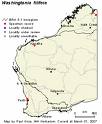California Washington palm Tree Information
Images of California Washington palm:






California Washington palm grows in the following 6 states and provinces:
Arizona, California, Colorado, Hawaii, Maine, NevadaInformation about California Washington palm:
The Washingtonia Filifera is commonly known as the California Fan Palm, California Palm, California Washington-palm, Desert Palm as well as Washington Palm.
The currently accepted scientific name of California palm is Washingtonia filifera (Linden) Wendl. . There are no subspecies, varieties, or formae.California palm occurs in disjunct groves from the Turtle and Cottonwood Mountains and the Twenty-nine Palms region of the Mojave Desert, California south to the Sierra de Juarez, the Sierra San Pedro Matir, and Sierra Pinnate Mountains, Baja California . Four groves are located in Clark County, Nevada , and five others are in La Paz and Yavapi Counties, Arizona . Most United States populations occur within the Colorado Desert along the San Andreas Fault. Due to California palm's value as an indicator species (see Site Characterisitics), all known California palm communities have been mapped . It is extensively planted as an ornamental in semiarid and subtropical regions of the world , and has naturalized in some places .California palm forms open to dense groves in moist areas, often providing 100 percent of overstory cover . Understory species are sparse in dense groves and more alkaline areas; they may be abundant in open groves or favorable sites . California palm communities separate into three distinct zones: the hydric zone, the oasis-proper, and the oasis-desert ecotone. Oases located at wash or stream sites gradually intergrade into open desert, while oases in seep areas generally have abrupt ecotones, grading sharply into xeric desert communities such as mesquite (Prosopis spp.) . Publications naming California palm as a dominant species are as follows: Sonora Desert . Natural terrestrial communities of California . Riparian forest and scrubland community types of Arizona and New Mexico . The vascular plant communities of California .Some of the information provided here is attributed to:Howard, Janet L. 1992. Washingtonia filifera. In: Fire Effects Information System, [Online]. U.S. Department of Agriculture, Forest Service, Rocky Mountain Research Station, Fire Sciences Laboratory (Producer). , available at the USDA Fire Effects Information System (FEIS) website